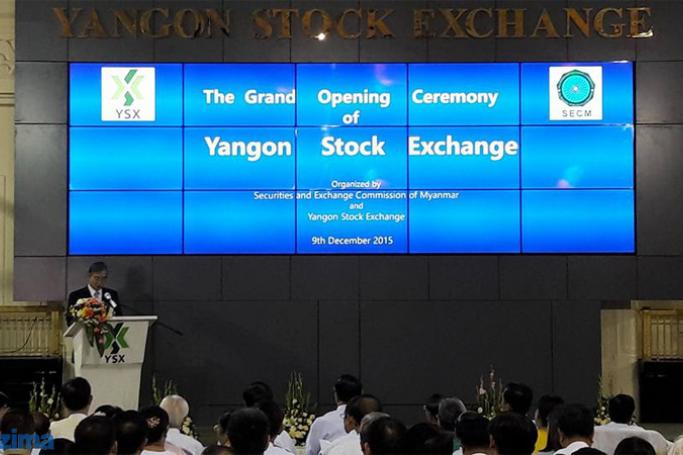In spite of not being ready to begin trading, the Yangon stock market is swinging its doors open with an “opening ceremony” on Wednesday, even as brokers and listed companies are still being rounded up for the bourse.
No trading will take place until more technical hurdles are overcome, said officials advising the bourse.
The trading operation has been created and backed by Japanese companies and officials, who say investors will have to wait for the market to come to full fruition in the coming days – or months.
“Three years ago, you couldn’t buy a new car in Myanmar, there was no such thing as an ATM and to all intents and purposes there was no mobile phone system,” David Grayson, chief executive of Auer Bach Grayson, a US brokerage that has been tracking the Yangon market’s long-awaited and much-delayed arrival told the Financial Times. “It’s like investing in a start-up — except the start-up is a country of 60 million people.”
Officials said the brokers, underwriters and first-listed companies are not yet clearly identified.
First Myanmar Investment, a conglomerate with interests from hospitals to airlines, Myanmar Citizens Bank and Myanmar Thilawa SEZ Holdings, which part-owns a Japanese-supported industrial zone southeast of Yangon, are among companies touted for listings, according to media reports.
Maung Maung Thein, Myanmar Securities and Exchange Commission chair, has said that the bourse is already 67 years late after Myanmar’s independence from Britain in 1948, so a few more weeks and months are nothing to get excited about.
The Yangon bourse is partly owned by the Japan Exchange Group, the operator of the Tokyo Stock Exchange, and Daiwa Securities, a stockbroker, reflecting Japan’s interest in the market.
Big obstacles face the market’s future, such as the exclusion of foreign investors from trading and the lack of public awareness of share dealing, a Japanese official was quoted as saying.
Another glitch: Myanmar Economic Bank, which holds a controlling stake in the Yangon exchange, is still under some restrictions imposed by the US government when the country was under junta rule.
Since most Western sanctions were lifted in 2013, foreign direct investment hit a record $8 billion during the 2014-2015 fiscal year as multinationals including Coca-Cola, Telenor, Colgate Palmolive, and Mitsubishi bet on an emerging consumer boom, according to the Financial Express website.
The middle-class and affluent consumer population is expected to nearly double from 5.3 million in 2012 to 10.3 million in 2020, according to Boston Consulting Group.
You are viewing the old site.
Please update your bookmark to https://eng.mizzima.com.
Mizzima Weekly Magazine Issue...
14 December 2023
Spring Revolution Daily News f...
13 December 2023
New UK Burma sanctions welcome...
13 December 2023
Spring Revolution Daily News f...
12 December 2023
Spring Revolution Daily News f...
11 December 2023
Spring Revolution Daily News f...
08 December 2023
Spring Revolution Daily News f...
07 December 2023
Diaspora journalists increasin...
07 December 2023
Mizzima interview with Mr Adriano Campolina, Chief Executive, Action Aid International












